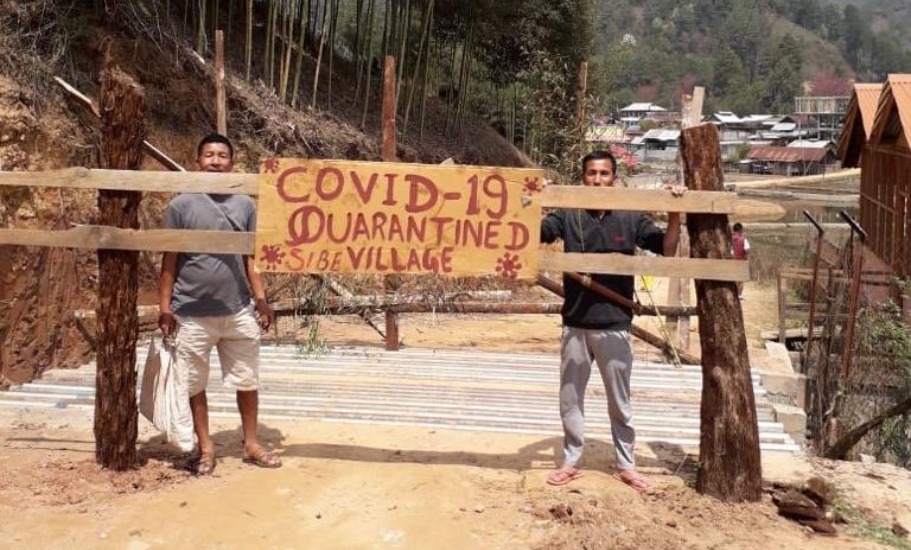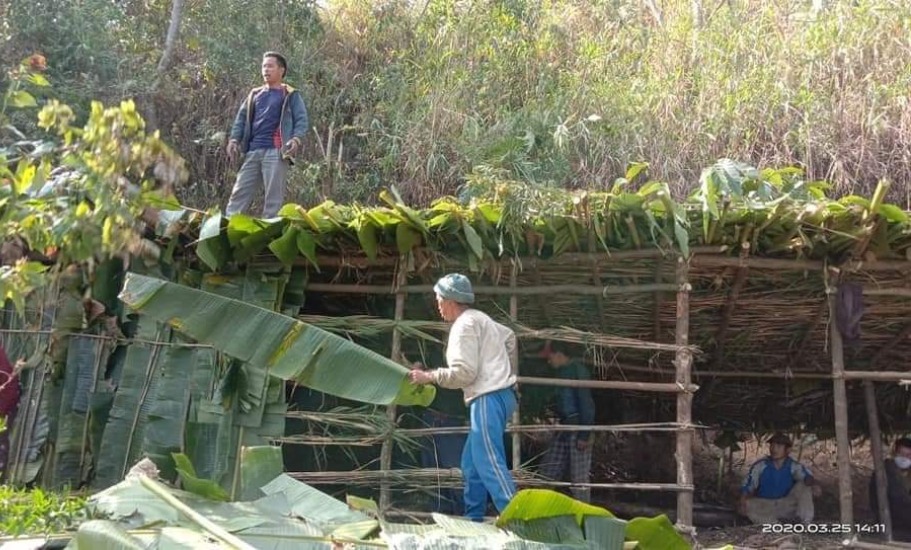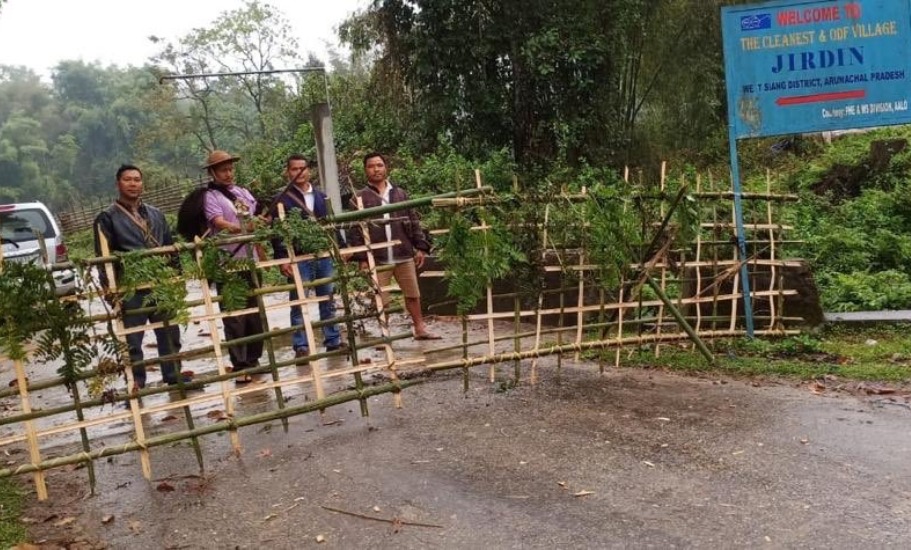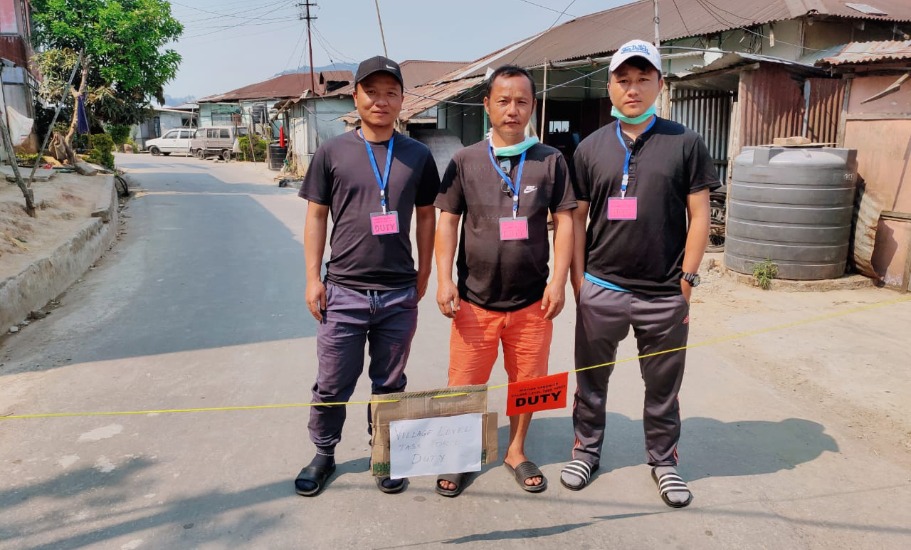
How villagers in northeast are self-enforcing lockdown
Entire India has gone into lockdown in the wake of the COVID-19 outbreak. The administration and the people are undergoing a tough time to enforce the lockdown, but here in the northeast, community-level implementation of the shutdown is helping the battle against the novel coronavirus.

Entire India has gone into lockdown in the wake of the COVID-19 outbreak. The administration and the people are undergoing a tough time to enforce the lockdown, but here in the northeast, community-level implementation of the shutdown is helping the battle against the novel coronavirus.
While some villagers have sealed their areas to restrict unnecessary movement, some are building quarantine centres on their own in their villages in the north-eastern states.
On March 30, villagers at the remote Hangrum hamlet in Dima Hasao district of Assam were seen constructing huts with bamboo poles and banana leaves. These are the quarantine zones meant for isolating the villagers who might arrive from their workplaces outside the state.

“These are eco-friendly quarantine zones made by the villagers. Some villagers who work outside — Chennai, Mumbai, Bangalore and other places — will be arriving soon. They will be staying in these quarantine zones for the next 14 days away from their family members. This is around three kms away from the village. Villagers have also been made aware about the COVID-19,” said Noah Daima, a local leader.
These huts will be able to accommodate at least 20 individuals. The village, dominated by the Zeme Naga tribal community, is located along the Assam-Manipur border.
In neighbouring Mizoram, despite the lockdown, tailors, designers and volunteers are engaged round the clock in producing Personal Protective Equipment (PPE) for the health workers and other individuals involved in emergency services.
Related news: 10,000 Assamese migrants stranded in Mizoram amid lockdown: Police
These items include face-shields, masks, gloves, coverall or gowns, head covers, shoe covers and Hazmat suits among others.
According to an Indian Express report, C Lalramdini, professor, Regional Institute of Paramedical and Nursing Sciences (RIPANS), had launched the initiative with a Facebook post and a WhatsApp group link.
“I was sitting in my room and just reflecting. (I thought) this is an epidemic, and there is going to be a shortage no matter how hard the government tries. And I suddenly remembered all the expert tailors in Mizoram, and thought, why not use the talent?” the report quoted Lalramdini as saying.
The Facebook post received a huge response and the WhatsApp group reached its maximum membership limit in just two hours.

Then, Ruby Ngente, a Mizo homeopathy doctor based in Maharashtra’s Nashik, also decided to engage herself in streamlining the process.
“I can’t go back home because of the lockdown, but I wanted to help. So we decided to streamline the process, make sub-groups, and reach out to the administration,” said Ngente. This is how these people joined hands so that there is no shortage of PPE in the northeast.
Mizoram with an amazingly high literacy rate has always been able to draw attention in the past — be it for the traffic rules or the disciplined netizens.
Another crucial role played by the Local Level Task Force (LLTF) in the fight against the COVID-19. Many have termed the LLTFs as the backbone of the fight. The LLTF comprises of prominent people from each locality. They are a part of the Young Mizo Association (YMA), an influential body of the state.
Related news: Assam govt to set up 4 temporary hospitals for COVID-19 patients
“In our community, people take up their work very seriously once they are appointed (as volunteers at LLTF). Only those people who have extreme reasons like a sickness or death in family or duties involved with the state government, are excused and a replacement is appointed in their place. The LLTF is the reason why I haven’t seen a single police officer in our localities till now,” said Kima, a blogger from Mizoram.
This is unique as compared to the rest of the country where police had a tough time to implement the lockdown.
“People obey the LLTF. And yes, there will always be one or two stray persons who violate the rules. If the LLTF catches such people, they are punished, but not by violent means. If someone is caught, he or she will be asked to sweep the road or perform a similar act as punishment,” added Kima.

These are just two of the many such incidents which is making the life of police and the administration easier amid this 21-day nationwide lockdown.
Likewise, in many villages in Assam, Arunachal Pradesh and Manipur among others, villagers have blocked the entrances with bamboo barricades to stop the unnecessary movements of the people.
Uploading such photos from an Arunachal Pradesh village on Twitter, Chief Minister Pema Khandu said it’s encouraging to see the villagers imposing the self-quarantine measures.
“Apart from govt doing its best to implement lockdown, it’s encouraging to see villagers across Arunachal imposing isolation, self-quarantine and keeping vigil on unnecessary movements in village. It’s a fight, which must be waged by all. Salute to their spirit! #IndiaFightsCorona (sic),” tweeted Khandu.
Related news: Why coronavirus may bring succour to Assam’s ‘stepchildren’
Some of the village women were also seen distributing vegetables among the migrant workers who were stuck because of the lockdown in Arunachal.
In Nagaland, many landlords have exempted the daily rents of the daily wage earners during the lockdown period. Nagaland chief secretary Temjen Toy has appreciated the gesture.
“It is so very heart-warming to learn that some house owners of Nagaland have decided not to charge rent from their daily wage tenants in view of Covid-19. This exemplifies the spirit and solidarity required at this juncture,” Toy said.


